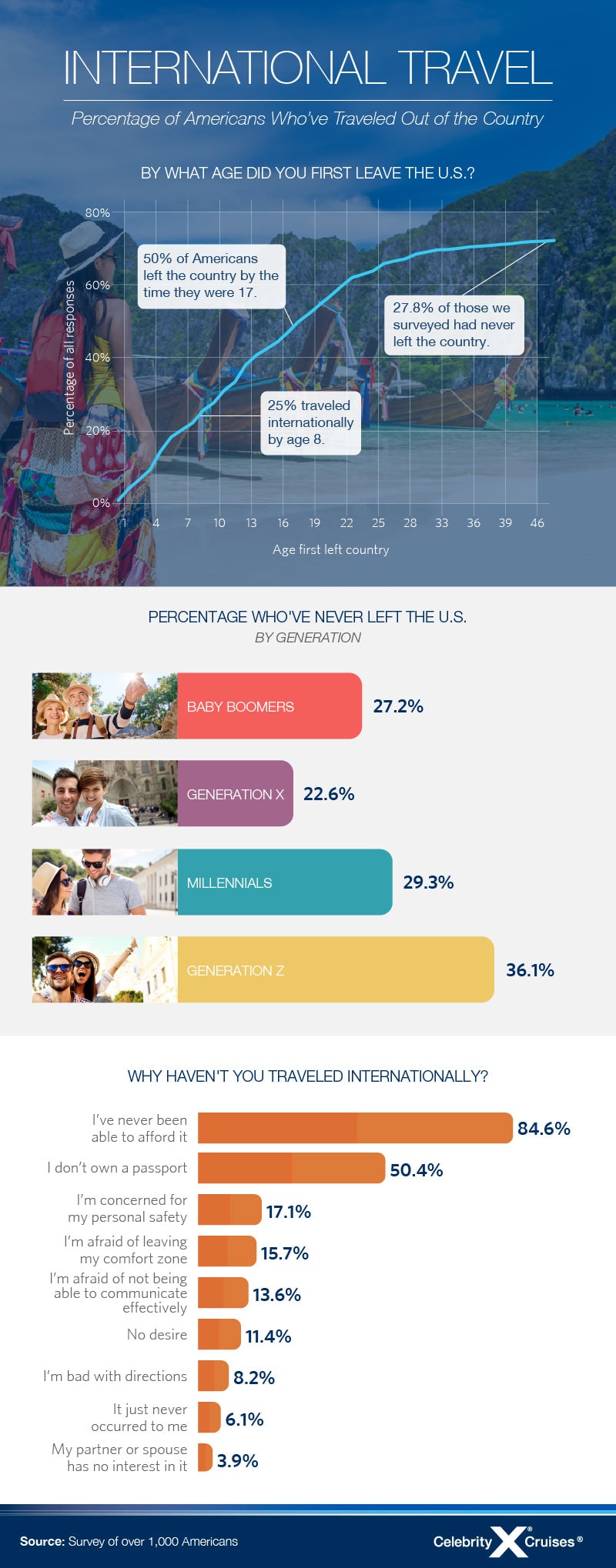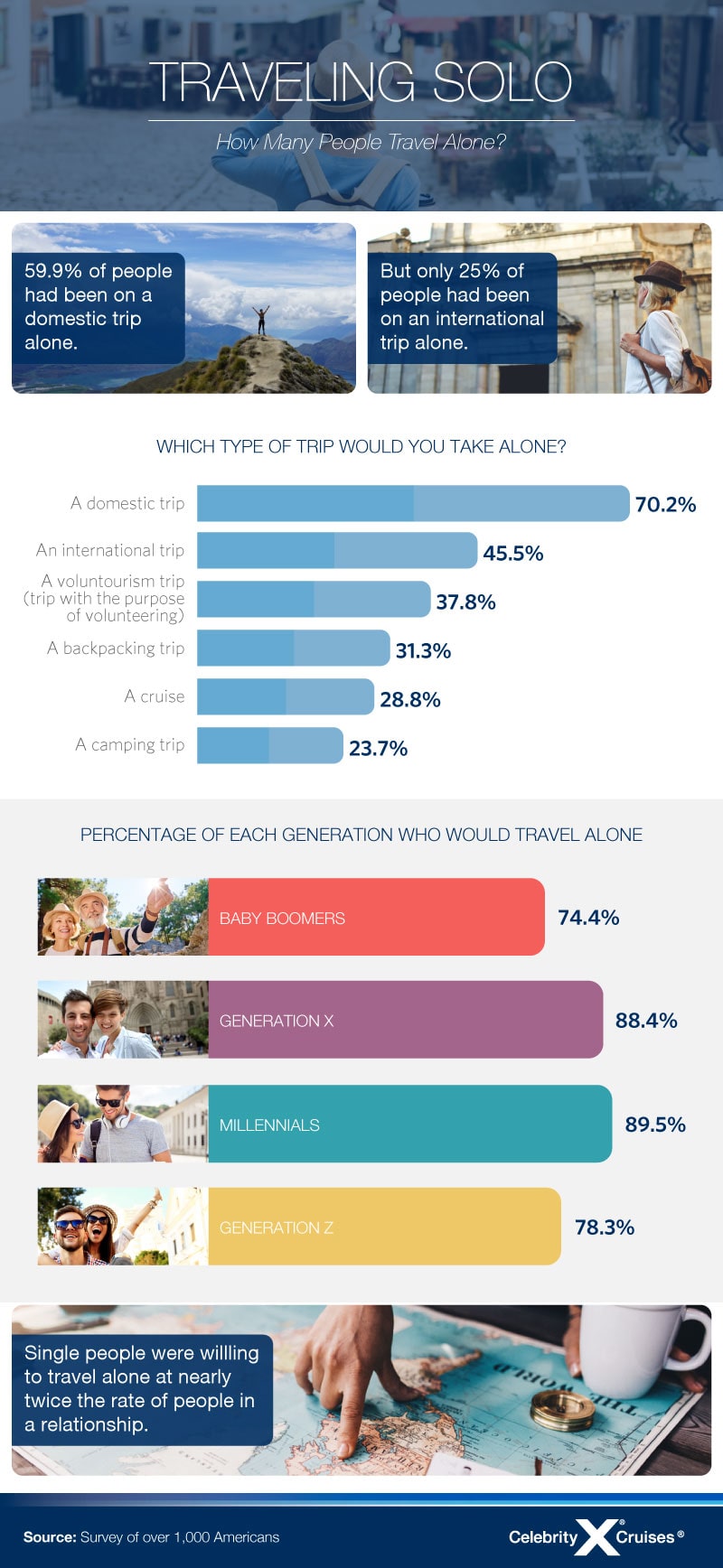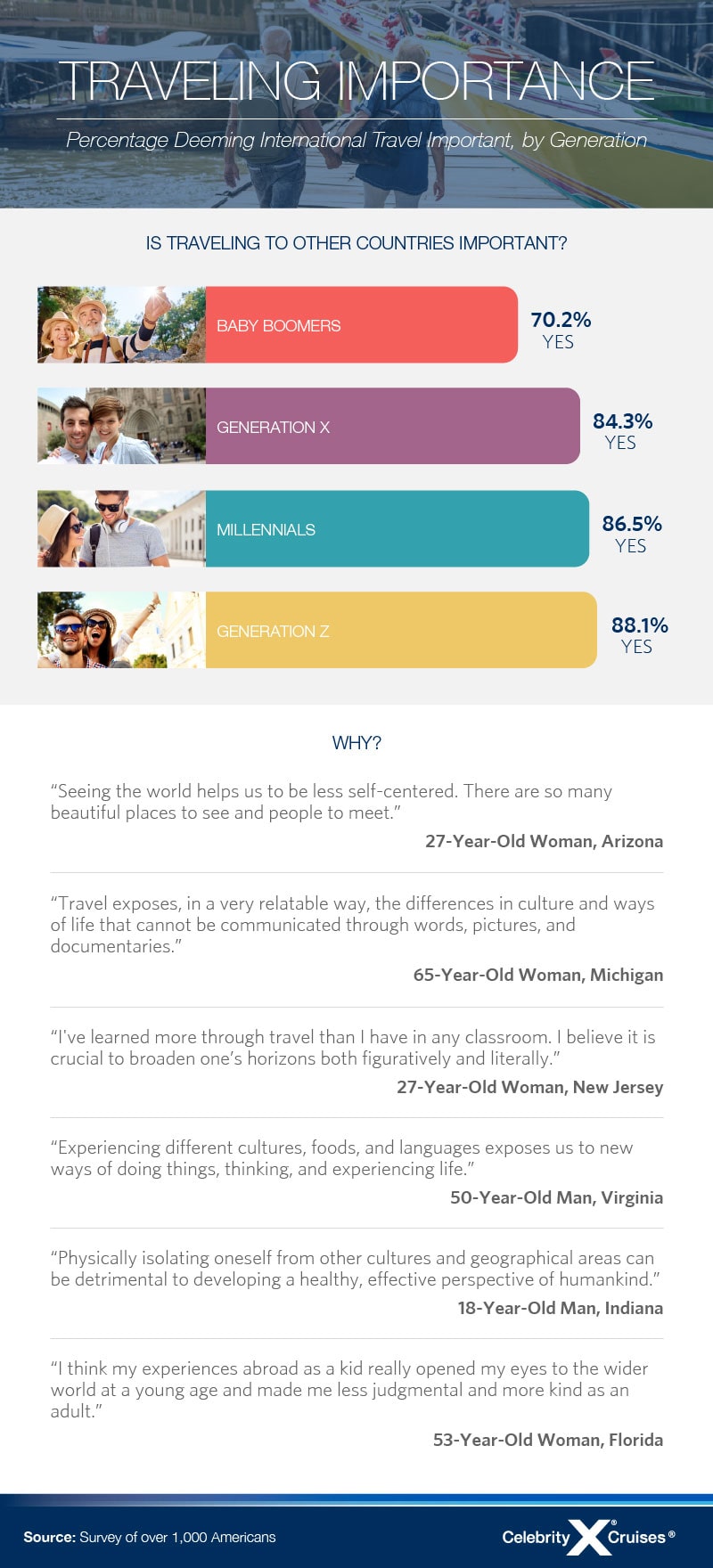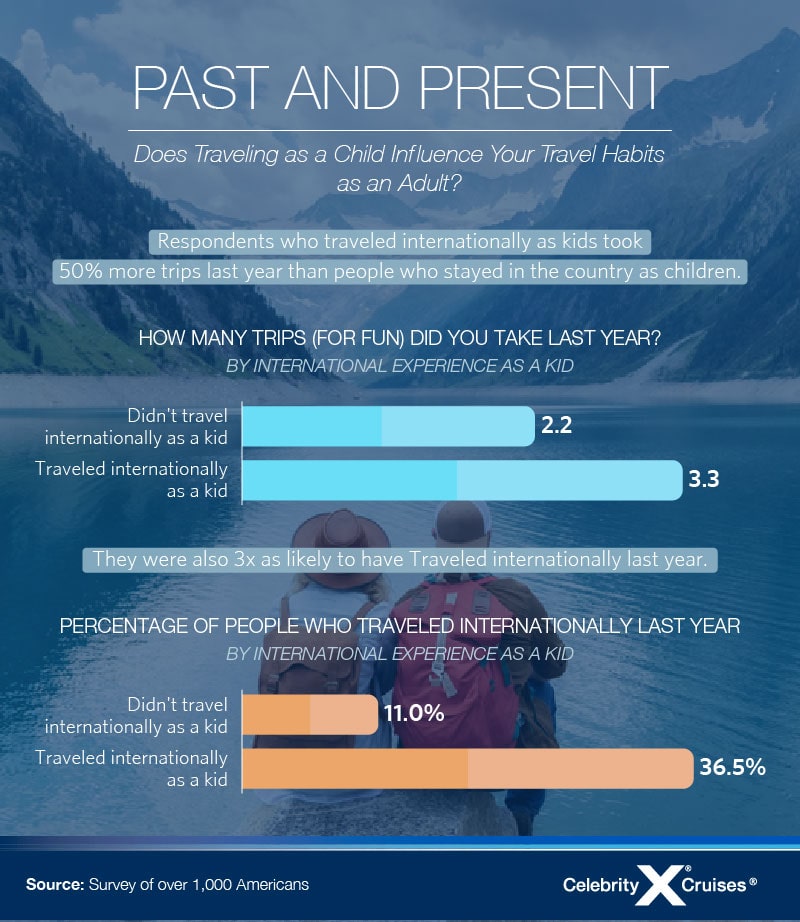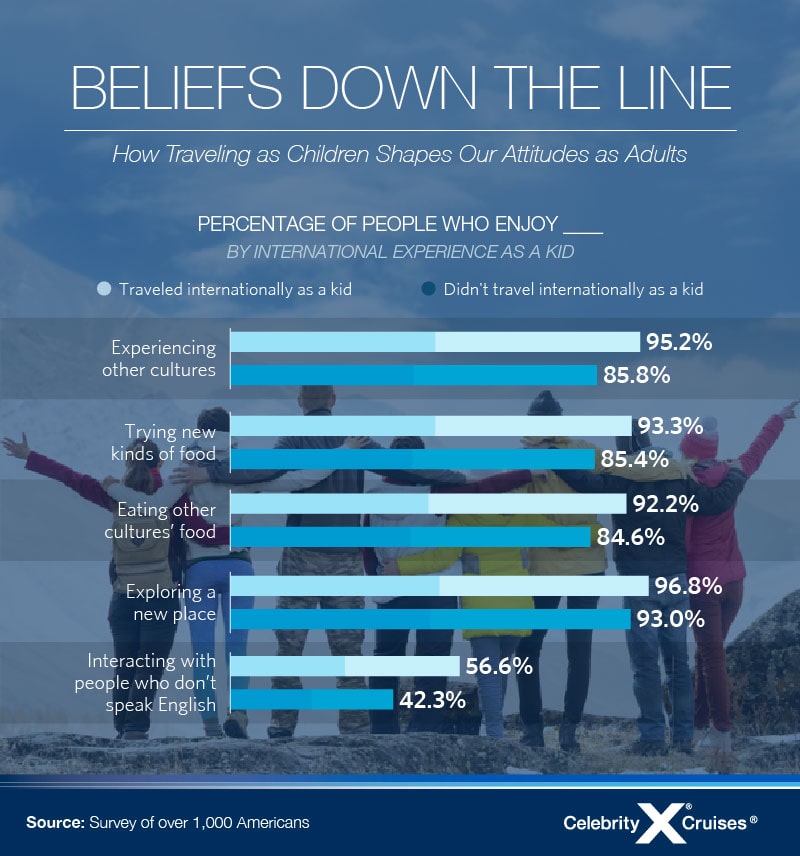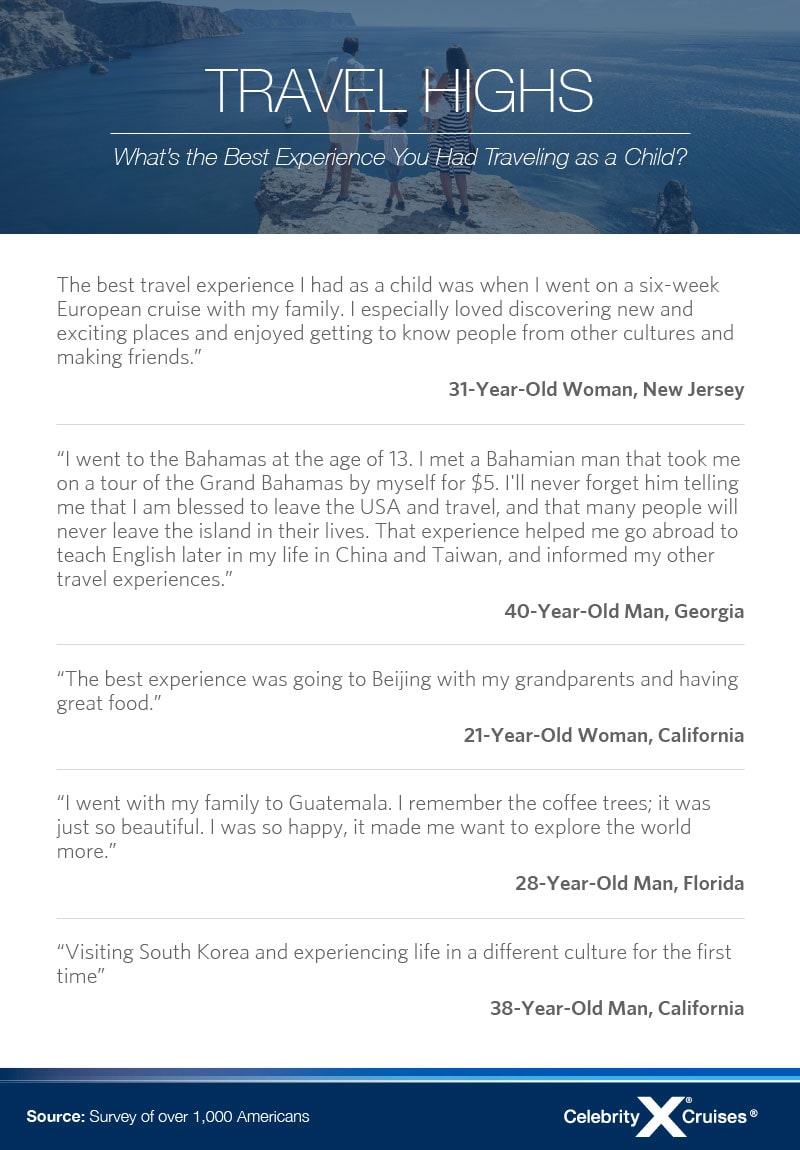Buoyed by a strong economy, Americans are venturing abroad in unprecedented numbers. According to federal figures, approximately 80 million U.S. citizens traveled to another country in 2017, driving a spike in passengers on international flights. Yet, many Americans remain sidelined from these travel trends, willingly or otherwise. In fact, most U.S. residents don't currently possess a passport, putting international destinations out of reach.
What leads some travelers to journey abroad, while others are perfectly content within America's borders? In this project, we set out to answer that very question.
We surveyed over 1,000 individuals about their travel experiences and ambitions, asking whether they've visited other countries before. For those who had, we recorded their reflections on their international adventures. For those who had not, we explored why they remained at home. Additionally, we analyzed how childhood travel experiences influenced adult perspectives on visiting foreign countries. Keep reading to discover Americans' true attitudes regarding international travel and how early adventures abroad may shape their views.
Exposure Abroad vs. Staying in the States
Among the individuals surveyed, the majority had ventured abroad: Less than 28 percent had never left America. In fact, half of respondents had traveled outside the U.S. by the time they turned 17, and a quarter had done so by age 8. Understandably, members of Generation Z and millennials had the highest percentage of respondents without international experiences: These young people may not have had the opportunity yet. However, 27 percent of baby boomers had also abstained from international travel, suggesting a longstanding lack of interest or ability. Their window of opportunity has not yet closed, though. Recent research suggests that nearly half of senior citizens hope to travel abroad in the near future.
Among those who had not traveled internationally, the most common barrier was financial: Almost 85 percent reported they could not afford a foreign trip. Additionally, half of this group said they lacked a passport, although the percentage of Americans with passports has dramatically increased in recent decades. Concerns related to safety and leaving one's comfort zone were also relatively common for remaining within the U.S. But over 11 percent reported no desire to travel abroad, while another 6 percent said doing so had never occurred to them. It seems that while international travel appeals to most Americans, tangible and psychological barriers keep many close to home.
Adventuring Alone
Some research suggests that solo travel is on the rise: In contrast to the constant connection of our digital lives, journeying alone can seem restorative. Most of our respondents reported taking at least one trip solo, but their destinations were typically domestic. Just a quarter reported traveling internationally without others, although nearly 46 percent were open to the prospect. Interestingly, some data indicate that women may be more inclined to take solo trips abroad than men. According to experts, these globe-trotting adventures are increasingly possible as women delay parenthood and earn more than ever before.
Respondents' attitudes toward solo travel also hinged on the type of trip in question: For example, fewer than 1 in 4 respondents expressed interest in attempting a camping excursion alone. Additionally, respondents on both ends of the age spectrum were less inclined to take solo trips. In the case of baby boomers, this reluctance could reflect aging-related health concerns: If one should get ill or injured while traveling, it's helpful to have companions. Yet, millions of baby boomers are currently living without children or a partner, and being single seems to increase solo-travel's appeal. Among our respondents, single folks were roughly twice as willing as individuals in a relationship to travel alone.
Traveling Abroad: Importance and Advantages
International travel resonates particularly with younger Americans: Millennials and Gen Zers were the most likely to regard visiting other countries as important. This finding complements a body of evidence suggesting millennials prize experiences over tangible items – and spend their money accordingly. Conversely, just 70 percent of baby boomers felt traveling abroad was important. Among older respondents, this perspective could reflect some defensiveness: If they haven't traveled abroad thus far, they may be reluctant to attach much significance to doing so.
In describing the benefits of international travel, some younger respondents described such experiences as more edifying than their formal education. Others felt traveling abroad enabled moral self-improvement, allowing them to "be less self-centered" or develop an "appreciation for others." Indeed, some experts suggest that travel can increase one's capacity for empathy, improving interpersonal relationships as a result. Additionally, travel may even extend one's life span: Some studies indicate that trips can keep dementia, Alzheimer's, and even cardiac arrest at bay.
Early Travel Experiences: Influences in Adulthood
In some respects, the potential benefits of traveling as a child seem obvious: Direct experience of other cultures can transcend anything learned in a classroom, while family bonds can strengthen on the road. But those who go abroad as kids may also receive an entirely different gift – a lifelong love of travel. Respondents who traveled internationally as children were more inclined to take trips as adults: They reported 3.3 leisure trips each year, on average, as opposed to 2.2 trips for those who had not gone abroad in their youth.
Additionally, people who had traveled abroad as children were three times more likely to have visited another country within the last year. This finding suggests that international travel in childhood begets a yearning for more adventures in other countries, but other factors could also influence this dynamic. For example, if one has family in other countries, that connection would justify trips abroad in both childhood and adulthood. Additionally, travel patterns likely reflect family finances: Children of wealthy parents are more likely to be wealthy themselves. Accordingly, if parents can afford to take their children abroad, their kids are more likely to possess the means to travel as adults.
Experimentation Inclinations
If those who travel internationally in childhood go abroad more often as adults, which parts of the journey do they particularly enjoy? Our findings indicate that individuals who traveled internationally as children were significantly more likely to enjoy various novel experiences, from taking in other cultures to experimenting with unfamiliar cuisines. This result provides an interesting counternarrative to the notion that openness to experience is an inherited trait, rather than one that can be developed. If our findings are any indication, it seems that early exposure to foreign cultures could lead to positive risk-taking in adulthood.
Of course, some interactions can get uncomfortable regardless of prior travel experience. Less than 57 percent of childhood travelers said they enjoyed interacting with individuals who don't speak the same language. Among those who hadn't traveled abroad as kids, even fewer enjoyed these verbal challenges. Of course, this discomfort can be a fast-track to fluency: Studies consistently indicate that individuals learn new languages much more quickly through total immersion than classroom teaching.
International Nostalgia
When we asked respondents to recall their most outstanding travel experiences from childhood, many described extended trips across multiple countries. One 31-year-old New Jersey resident recounted a six-week European cruise with her family in glowing terms, noting the lengthy trip allowed her to get to know others from different cultures. Similarly, a 49-year-old Massachusetts man mentioned visiting three European countries on a tour when he was 15 years old.
For others, however, a single country delivered a cherished experience. One respondent described a food-filled visit to Beijing with her grandparents (according to some travel experts, these "skip-gen" trips are trending). A 28-year-old man expressed similar nostalgia about a family trip to Guatemala, saying it kindled a desire to explore the world further. Indeed, many respondents articulated some version of this theme: Travel doesn't resolve the urge to explore; it fuels it.
Adventures Abroad at Any Age
Our findings suggest that interest in traveling abroad varies considerably. While many travel internationally at every opportunity, a significant portion of Americans are content to stay home or confine their travels to U.S. soil. Yet, our data also indicates that childhood experiences abroad correlate with subsequent travel interest, indicating our adult preferences can be shaped by prior exposure.
So if you find yourself daunted by the prospect of traveling abroad, consider whether your anxieties stem more from a lack of experience than any potential obstacle. International travel can certainly be demanding, both logistically and financially. But when so many attest that going abroad is well worth the effort, you may just decide to experience it for yourself.
If you're looking to experience other countries in maximum comfort, we've got you covered. Celebrity Cruises provides unforgettable travel experiences around the world aboard their fleet of award-winning ships. We take the stress and uncertainty out of traveling abroad so that you can focus on your priorities: indulging and enjoying on an international scale.
Methodology and Limitations
To compile the data shown above, we surveyed 1,040 Americans solicited on Prolific.ac. To define whether someone traveled internationally as a kid, they needed to have visited at least one country outside the U.S. by the age of 18. Outliers from any averages presented were removed, and every effort was made to fairly convey responses. No personally identifiable information was collected, and any quotes have been anonymized if any identities were inadvertently given, as well as edited for spelling and grammar. Because the methodology relies on a survey, it is susceptible to biases and influences common to any survey, such as self-reporting, recency, and telescoping biases. Every effort was made to fairly portray data in this study.
Fair Use Statement
We hope this content will travel far and wide, and you can play a part in its journey across the internet. Please share this project for any noncommercial purpose, bringing our work to your family, friends, and followers. When you do, please link back to this page so that others can explore our data. Who knows: Our findings may even convince someone to give international travel a try.

